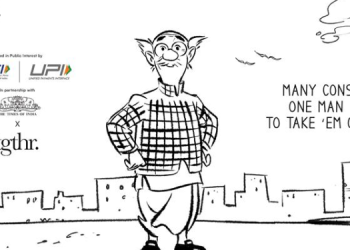With addictions on the rise, causing disruptions in families and society, Doctor Against Addiction (DaAD) initiated ‘A Prescription for Deaddiction’ to enable doctors to combat addictions early during consultations.
“At the heart of the campaign lies a powerful symbol – “HRx.” This symbol represents a prescription for harm reduction, a commitment by doctors to address the harm caused by addiction and harmful behaviours. It serves as a beacon of hope and change. ‘A Prescription for Deaddiction’ is not just a campaign; it’s a call for action. It envisions a healthcare landscape where doctors can be champions of change, equipped with the knowledge, compassion, and tools needed to address harmful behaviours. Often, doctors routinely check height, weight, BP and sugar levels. Now they are being trained to identify classical symptoms of addictions of various forms,” says Dr Manish Sharma, Chief Coordinator, Doctors Against Addiction (DaAD).
The “HRx” symbol allows doctors to specify the form of addiction or harmful behaviour they aim to address. Due to the complexity of the world, people turn to various behaviors and substances like gadget addiction, alcohol, drugs, and tobacco for solace. Though these may bring temporary relief or pleasure, they can also cause significant harm to individuals and society.
DaAD believes healthcare professionals can play a crucial role in addiction treatment and encouraging healthier habits due to their close patient connections
Deliberating on potential of Doctors Against Addiction (DaAD), and doctor-patient relationship, Dr Chhavi Gupta, DM – Infectious Disease, Senior Consultant at Yashoda Super-specialty Hospital, Kaushambi, Ghaziabad, says, “The foundation of any fruitful doctor-patient relationship is trust. And this is achieved when patients feel comfortable sharing their concerns, even when those concerns revolve around potentially harmful behaviours. By creating an atmosphere of trust and non-judgment, healthcare professionals can empower patients to open up and seek help.During these conversations, they can effectively counsel patients on deaddiction.”
Doctors are now being trained to patiently listen and ask open-ended questions in an effort to identify the type of addiction and reduce the stigma surrounding it through compassionate and tailormade dialogue.
DaAD isn’t a universal fix. It’s personalized, tailoring strategies to each patient for better results. Encouraging patient involvement in goal-setting and follow-ups is key. Healthcare pros now promote addiction awareness and back community efforts.
“Beyond physical harm, excessive behaviours can wreak havoc on mental well-being leading to anxiety, depression, and a diminished sense of self-worth. Alcohol and drug abuse can lead to altered mood states, cognitive impairment, and exacerbation of pre-existing mental health conditions. However, by approaching the conversation without judgment, healthcare professionals can make patients feel respected and understood. Consistent monitoring reinforces the doctor-patient partnership. And “A Doctors Against Addiction (DaAD)is a step forward in this direction, to help patients achieve their deaddiction goals,” says Dr Narender Saini, Former General Secretary of the Indian Medical Association (IMA).
Excessive behaviors harm physical health. This includes screen time causing digital eye strain, disrupted sleep, and posture issues, and alcohol/drug abuse leading to liver damage, cardiovascular problems, addiction-related illnesses, and overdose. Immediate effects underline the importance of moderation.
‘A Prescription for Deaddiction’ envisages to address the issue of addiction holistically, wipe out stigmas and mainstream the affected individuals.

















